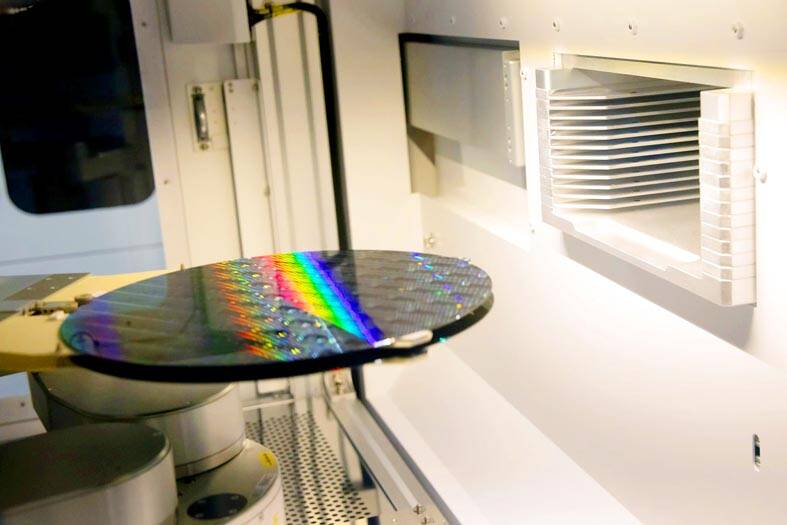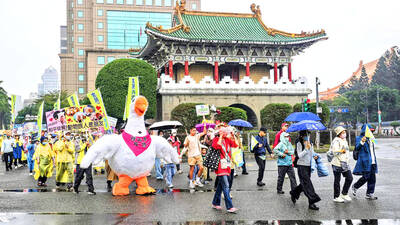The US is to send officials in charge of chip development to Taiwan, Japan and South Korea to promote cooperation in the global semiconductor supply chain, the US Department of Commerce said on Tuesday.
Chips Program Office Director Michael Schmidt announced the visit, which marks the first time officials from the office are to visit the three nations since it was set up in September last year.
“As semiconductors and technologies continue to evolve, the United States will keep working with allies and partners to develop coordinated strategies to ensure that malign actors cannot use the latest technologies to undermine our collective economic and national security,” Schmidt said.

Photo: Bloomberg
“In implementing the CHIPS and Science Act, the Department of Commerce is engaged extensively with key partners and allies, including authorities in the Republic of Korea [South Korea], Japan and Taiwan, as well as the Indo-Pacific Economic Framework, the European Union, and the United States Trade and Technology Council and North American Leaders’ Summit,” he said.
While the office did not disclose any details about Schmidt’s trip, a senior official from the department, who asked not to be identified, said the delegation would include Sam Marullo, senior policy adviser to the office, and Frances Chang, who supervises international exchanges in the office.
Asked whether the delegation would meet Taiwan Semiconductor Manufacturing Co (TSMC) executives, the unnamed official said only that the department would release details at an appropriate time.
“We intend to make this a really important part of our discussions with [South] Korea, Japan and Taiwan,” the official said.
According to the CHIPS Act, the US government is to inject US$52.7 billion into the US semiconductor industry to shore up its manufacturing, and research and development strength.
Funding would include US$39 billion in subsidies for companies that build new facilities and expand production capacity in the US.
The department is reportedly planning to take applications in late June from companies eyeing the subsidies.
The department also announced the so-called National Security Guardrails, which are to ban recipients of US government subsidies from investing in most semiconductor manufacturing in foreign adversary countries — China, Russia, Iran and North Korea — for 10 years after the date of being awarded funding.
The measures also aim to limit funding recipients from engaging in joint research or technology licensing efforts with any of the four countries to develop a technology or product that raises national security concerns, it said.
TSMC is building fabs in Arizona that are to make chips using the 4-nanometer and 3-nanometer processes, with mass production scheduled to begin next year and in 2026.
The unnamed department official declined to comment on whether TSMC is seeking subsidies from the US government.
Hsinchu-based GlobalWafers Co has also begun construction of a 12-inch silicon wafer plant in Texas, with the aim of beginning mass production next year.

NUMBERS IMBALANCE: More than 4 million Taiwanese have visited China this year, while only about half a million Chinese have visited here Beijing has yet to respond to Taiwan’s requests for negotiation over matters related to the recovery of cross-strait tourism, the Tourism Administration said yesterday. Taiwan’s tourism authority issued the statement after Chinese-language daily the China Times reported yesterday that the government’s policy of banning group tours to China does not stop Taiwanese from visiting the country. As of October, more than 4.2 million had traveled to China this year, exceeding last year. Beijing estimated the number of Taiwanese tourists in China could reach 4.5 million this year. By contrast, only 500,000 Chinese tourists are expected in Taiwan, the report said. The report

Temperatures are forecast to drop steadily as a continental cold air mass moves across Taiwan, with some areas also likely to see heavy rainfall, the Central Weather Administration (CWA) said. From today through early tomorrow, a cold air mass would keep temperatures low across central and northern Taiwan, and the eastern half of Taiwan proper, with isolated brief showers forecast along Keelung’s north coast, Taipei and New Taipei City’s mountainous areas and eastern Taiwan, it said. Lows of 11°C to 15°C are forecast in central and northern Taiwan, Yilan County, and the outlying Kinmen and Lienchiang (Matsu) counties, and 14°C to 17°C

STEERING FAILURE: The first boat of its class is experiencing teething issues as it readies for acceptance by the navy, according to a recent story about rudder failure The Hai Kun (海鯤), the nation’s first locally built submarine, allegedly suffered a total failure of stern hydraulic systems during the second round of sea acceptance trials on June 26, and sailors were forced to manually operate the X-rudder to turn the submarine and return to port, news Web site Mirror Daily reported yesterday. The report said that tugboats following the Hai Kun assisted the submarine in avoiding collisions with other ships due to the X-rudder malfunctioning. At the time of the report, the submarine had completed its trials and was scheduled to begin diving and surfacing tests in shallow areas. The X-rudder,

DEMAND: The government should enact regulations in line with Austria and Germany to incorporate vegan nutrition into school meals, an advocate said More than 1,000 people yesterday marched in Taipei to promote veganism, calling for legislation to incorporate vegan diets into school lunches and the national net zero emissions program. Participants gathered on Ketagalan Boulevard in front of the Presidential Office Building for the march, which was organized by the Vegan Action Network (VAN). Former ambassador to Chad Chiu Chung-jen (邱仲仁), actor Yankee Yang (楊子儀) and actress Cindy Lien (連俞涵) attended the event. VAN member Marianne Chao (趙梅君) said that the campaign aimed to urge the government to promote vegan diets across schools and government agencies via legislation and national policies, which would help build